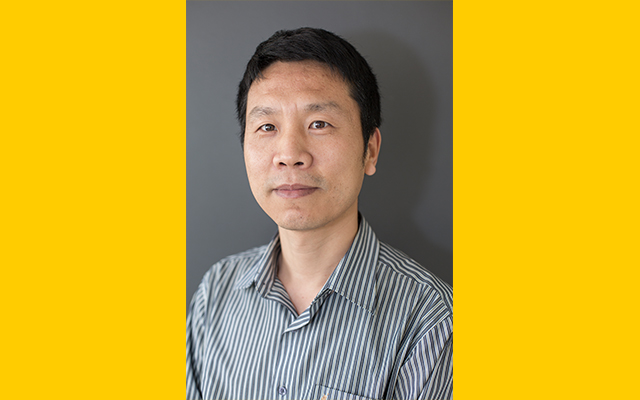Professor Wei Gao
Research for a New World
 Currently, Professor Wei Gao of the Centre for Infrastructure, Engineering and Safety (CIES) is completing a substantial Australia Research Council Discovery grant project entitled Unified non-deterministic dynamic safety assessment of softening structure and an industry-based research project Advanced analysis and safety assessment framework for structures under uncertainty.
Currently, Professor Wei Gao of the Centre for Infrastructure, Engineering and Safety (CIES) is completing a substantial Australia Research Council Discovery grant project entitled Unified non-deterministic dynamic safety assessment of softening structure and an industry-based research project Advanced analysis and safety assessment framework for structures under uncertainty.
No stranger to ARC and industry success, these projects represents another stage in Professor Gao's established and ever-expanding reputation for solving intractable engineering problems. The resulting research will release the full potential of machine learning technology and computational mechanics by developing a high-performance tool for dynamic safety assessment of softening structures.
When structures fail or 'soften', an analysis of the nonlinear, elastoplastic behaviour is often required to determine why the failure has occurred. Structures are subject to the uncertainties of construction tolerance and external loading. Degradations, corrosions, environmental attacks and the general ageing process all take their toll on infrastructure. The Australian National State of the Assets 2018 tells us that numerous buildings and infrastructures built in the 60s and 70s now require billions of dollars of significant renewal.
With this pressing situation in mind, Professor Gao is developing a robust, cost-effective and efficient approach to analysing the causes of this structural 'softening', at both a constitutive and structural level. The development of a computationally tractable analysis method has been slow worldwide and it becomes apparent why Wei Gao's work is so important. Many attempts have been made to mitigate structural uncertainties in existing and new construction projects, but the analysis, design and reparation processes remain cumbersome and exorbitantly expensive when based on experimental investigation.
Currently, the statistical databases recording the elastoplastic responses of a practical structure cannot embody all the variations and uncertainties which are commonly described by randomness. Creation of reliable and accurate data bases is just too time consuming and too expensive due to the huge number of specimens and tests required. So effective experimental databases are just not available.
Computational analyses then become a very attractive option for the construction industry. In theory. Large structures still present a problem, as multiple analyses are required to present a complete probabilistic spectrum and the process typically involves large computational expense and complex processes.
The two tandem projects lead by Wei Gao have already developed advanced data-driven frameworks that significantly enhance the efficiency of performing structural nonlinear elastoplastic uncertainty analyses and dynamic reliability assessments. This framework contains a database that would make it easy to incorporate all available and new data, including experimental results, performing both pure and hybrid analyses. This kind of approach could revolutionise computational analysis.
But never one to sit still, Wei Gao is also leading an ARC Research Hub for Nanoscience based construction material manufacturing. In partnership with Monash University and industry, this group of academics are researching the reliability, or otherwise, of novel construction materials. "Advanced materials such as functionally graded materials, porous steel and new types of concrete have attracted considerable interests in the last two decades. The safety of structures with such new materials is critical to their practical applications."
These new materials present a new challenge for researchers developing predictive tools. All stakeholders are naturally concerned with the possible uncertainties in structural properties and loads. New and untested parameters come into play and traditional reliability analyses become unsatisfactory in a context of random variability. "Reliability-based structural optimization is challenging but is much needed."
Professor Gao's research group is pioneering a stochastic isogeometric analysis that will have practical application in engineering practice. This kind of analysis is very new and comprehensive studies are still needed, but this research represents an international development in the sustainable use of advanced building materials. So far the research outcomes have been fundamental and promising, as Professor Gao's team create the groundwork for a burgeoning field of investigation.
The hub is also working with industry on robust performance assessment and optimal design of nano and composite structures. The use of advanced materials such as Functionally Graded Materials (FGMs) presents a challenging and exciting future for the engineering industry and for researchers at CIES.
New knowledge is required, new methods and frameworks. Spatial variability and multi-functionality of these advanced materials demand a micro-structural awareness that, practically, only machine learning technologies and computational mechanics can achieve. Machine Learning (ML), as a subset of Artificial Intelligence, uses patterns and inference, rather than specific instruction, to create analyses and predictions. These are the 'thinking' technologies. "ML looks like a promising tool to depict the constitutive law of materials and relationship between structural reliability and its parameters and working conditions, assisting engineers to deal with ongoing issues of material design and characterisation, as well as life-service reliability assessment of large-scale structures and infrastructures"
Professor Wei Gao is ahead of this wave of new knowledge and his bold research projects are testament to his innovative spirit, extensive interdisciplinary understanding and rigorous investigation of this new world.



